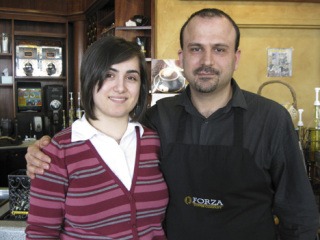Freedom came at a significant price for Salah Amani.
The journey from his native land – the troubled Kurdistan Region of Iran – to peaceful Auburn was long and difficult. It nearly cost him his life.
But now that he has discovered the comforts of the Pacific Northwest, the 35-year-old man isn’t about to turn back.
Even if it means never seeing his family again.
“Sometimes in your life, you have to weigh things,” said Amani, during a break between customers at his Forza Coffee franchise, just inside the North Auburn Top Food & Drug store. “You have to choose. You have to weigh whether you like or don’t like your life. I decided I wanted a better life. I wanted a future for myself.”
So Amani fled. He found refuge. He found a way to put behind him the violence that engulfed his past, the turmoil of his ethnically and politically torn region and reach for something better.
He found that new beginning in Auburn.
“I am happy now,” he said. “I am working. I have independence.”
Growing up in Kurdistan – “the land of Kurds” in mountainous northwest Iran bordering Iraq and Turkey – was anything but peaceful. It was a country divided then, much like it is today.
The Islamic Republic regime has long imposed a series of discriminative policies in Kurdistan, which finally led to the military occupation of the region, widespread poverty among its massive population, suppression of Kurdish culture, drug addiction (especially among youth), religious suppression, forced migration, imprisonment, terror, torture and the killing of anybody who opposed the regime’s tyrannical policies.
Kurds in Iran are officially recognized as a minority, although the government has not designated any Iranian territory as ethnically Kurdish.
As a child, Amani saw the conflict first hand. He witnessed police whisk away some of his friends and kill them.
His father died in jail as a political prisoner.
For Amani, the pain and suffering proved too much, the situation hopeless. Fed up with the repression of his people and the growing problems of mass poverty and unemployment, Amani fled to find a better life.
He was 14 years old.
Amani followed other Kurdish refugees across the border into Iraq. It was a 13-day walk.
Aligned with the Komala party, he worked in radio as a translator for seven years. He was educated and cared for in the Kurdish settlement.
But Amani couldn’t completely escape the troubles of a militarized border zone. One night, Iranian militants found and shot him in the chin.
“I nearly died,” he said. “I spent a year in a Baghdad hospital, recovering.”
With the help of his friends, Amani found the means to leave a dangerous place. He fled to Turkey, and after a long and complicated process, came to the United States through cooperative efforts between officials from the United Nations and YMCA International Services in Houston.
He soon found work and the means to survive, thanks to stateside refugee resettlement assistance.
Friends and circumstances eventually brought Amani to the Northwest where he opened a coffee shop.
It is here he found his love, Sima Javanmard Ghazi, a Kurdish emigrant and the granddaughter of Qazi Muhammad, a former nationalist and religious Kurdish leader.
They recently wed.
“We are happy together and working together,” she said. “We wish that all people can be as free.”
Amani and his wife are thankful for the new beginning, even if it has come with some emotional expense. Amani left behind two brothers, a sister and a mother, who since has remarried. Javanmard Ghazi left behind a son from a previous marriage. Pasha was 6 months old the last time she saw him.
“It is something she is not happy to talk about,” Amani said.
The couple plan to have children of their own someday. They have hopes and dreams, and here they have the opportunity to pursue them.
“I see there is life in other world,” Amani said. “I felt I could change my life in another world. And I am thankful to be in America, to be in Auburn.”


